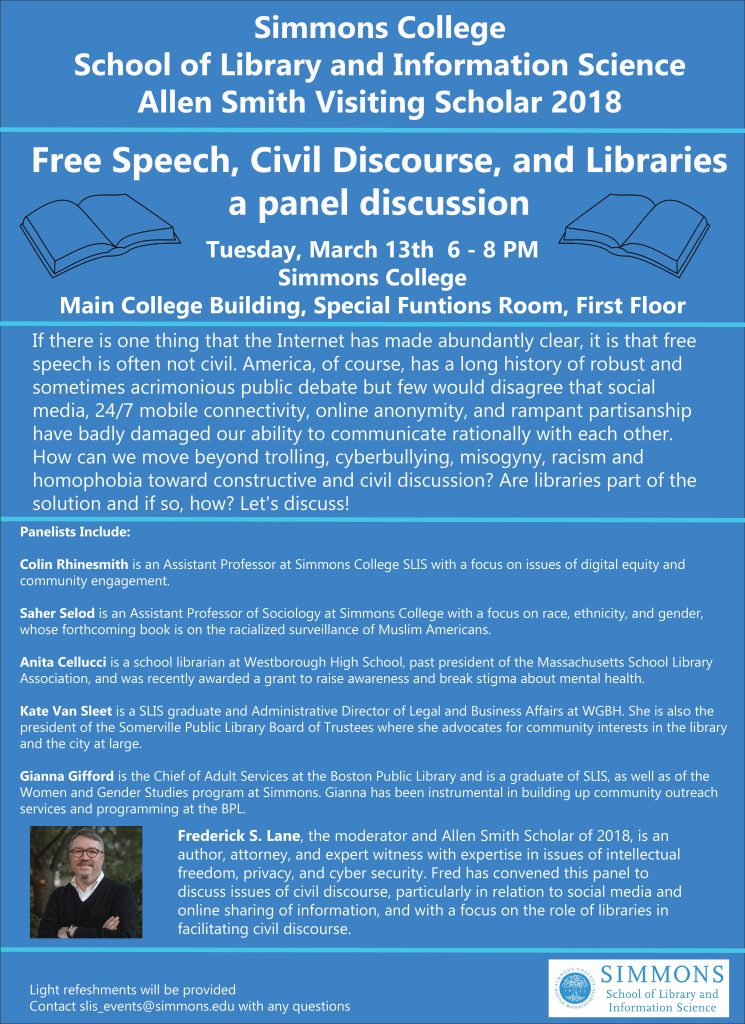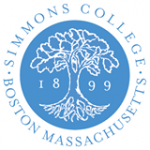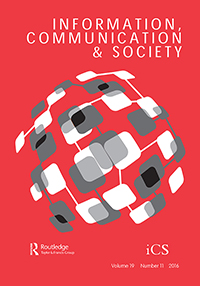I’m looking forward to joining a great group of speakers for this exciting event at Simmons College, titled “Free Speech, Civil Discourse, and Libraries” on Tuesday, March 13th at 6pm.

Founder and Director, Digital Equity Research Center
I’m looking forward to joining a great group of speakers for this exciting event at Simmons College, titled “Free Speech, Civil Discourse, and Libraries” on Tuesday, March 13th at 6pm.

Sharon Strover (UT Austin) just published an excellent article over at The Conversation on the broadband challenges facing rural Americans. In the article, she mentions some of what we’ve learned through our research funded through a grant from the US Institute of Museum and Library Services to understand how rural libraries address the challenges of internet connectivity through wifi hotspot lending programs.
Here’s an excerpt:
In our work, we have found a lot of people on tight budgets figuring out how to use local Wi-Fi connections to download content onto their phones, so they use (and pay for) less mobile data. Public libraries, which generally have fast and free Wi-Fi, are popular options in rural areas. Many rural librarians have told us about people in their parking lots after hours simply using the library Wi-Fi. Those connections aren’t always the fastest, but are a testament to the efforts of public libraries over many years to provide their communities’ residents with computer and internet services.
Read the full article here.
My colleagues and I have a new article that was published this past week in D-Lib Magazine. The article, which is co-authored with Sharon Strover (University of Texas at Austin), Brian Whitacre (Oklahoma State University), and Alexis Schrubbe (University of Texas at Austin) presents early findings from our Institute of Museum and Library Services (IMLS) research grant, titled “At the Edges of the National Digital Platform” (grant #RE-31-16-0014-16) which examines wireless hotspot lending programs in rural libraries in Kansas and Maine.
Here’s the abstract:
Libraries straddle the information needs of the 21st century. The wifi, computers and now mobile hotspots that some libraries provide their patrons are gateways to a broad, important, and sometimes essential information resources. The research summarized here examines how rural libraries negotiate telecommunications environments, and how mobile hotspots might extend libraries’ digital significance in marginalized and often resource-poor regions. The Internet has grown tremendously in terms of its centrality to information and entertainment resources of all sorts, but the ability to access the Internet in rural areas typically lags that experienced in urban areas. Not only are networks less available in rural areas, they also often are of lower quality and somewhat more expensive; even mobile phone-based data plans — assuming there are acceptable signals available — may be economically out of reach for people in these areas. With older, lower income and less digitally skilled populations typically living in rural areas, the role of the library and its freely available resources may be especially useful. This research examines libraries’ experiences with providing free, mobile hotspot-based access to the Internet in rural areas of Maine and Kansas.
Read the full article here.
 This Wednesday, April 12th at 12:00 PM at Simmons College, Madison Bishop and I will be presenting a talk, titled “Checking Out The Internet” as part of the SLIS Public Lecture Series. Here’s the event info:
This Wednesday, April 12th at 12:00 PM at Simmons College, Madison Bishop and I will be presenting a talk, titled “Checking Out The Internet” as part of the SLIS Public Lecture Series. Here’s the event info:
How do hotspot lending programs help rural libraries address the unique challenges of Internet connectivity in their communities? This talk will present findings from a research project to explore how mobile wireless hotspot devices—which allow users to access the Internet from any place with a cellular signal—shape internet access and use for the patrons of 24 libraries in rural Kansas and Maine. The research examines the practical requirements for implementing hotspot lending programs; the impact on users’ digital literacy and quality of life; the role of libraries in rural information ecosystems; and the relationship between library hotspot lending programs and other institutions, including schools, local governments, and Internet service providers. This project is being led by researchers at the University of Austin at Texas, Oklahoma State University and Simmons College and funded by a grant from the U.S. Institute of Museum and Library Services.
Presenting on this project will be Co-Principal Investigator Colin Rhinesmith, Assistant Professor in the Simmons School of Library and Information Science, and research assistant Madison Bishop, second-year graduate student.
 Dr. Miriam Sweeney (School of Library and Information Studies, University of Alabama) and I have a new paper published in Information, Communication & Society. In the article, titled “Creating Caring Institutions for Community Informatics,” we develop a feminist ethics of care framework for researchers and practitioners in the field of community informatics.
Dr. Miriam Sweeney (School of Library and Information Studies, University of Alabama) and I have a new paper published in Information, Communication & Society. In the article, titled “Creating Caring Institutions for Community Informatics,” we develop a feminist ethics of care framework for researchers and practitioners in the field of community informatics.
Here is the abstract:
This paper explores the potential affordances of applying a feminist ethics of care approach to community informatics practices in public internet access facilities. As feminist technology scholars have long observed, technology and technoculture are strongly encoded as masculine, privileging traits such as scientific knowledge, rationality, objectivity, and distance. These characteristics are expressed in traditional infomediary practices in a variety of ways, including notions of expertise, ways of conceptualizing technology, emphasis on skills attainment, and deficit-based models of user behavior. In contrast, ethics of care emphasizes the importance of relational and situated knowledge, pluralistic voices and experiences, and relationships bound by mutual interdependence. Traditionally, caring has been feminized and thus necessarily excluded from technoculture and relegated to invisible and unpaid labor. Caring and associated affective labor practices remain an under-examined subject in infomediary practices. Public libraries and community technology centers are logical places to explore for care work, given that they share many characteristics of the spaces where care work has historically been performed. We argue that an ethics of care framework has several possible affordances for infomediary practices in these institutions, including highlighting the gendered power dynamics that define and shape existing practices; distributing care work and making existing care work visible; and envisioning a more holistic and ethical approach to engaging diverse publics. We translate Tronto’s seven warning signs for ‘bad care’ in institutions into seven positive guidelines for providing ‘good care’ in public internet access facilities, then contextualize these for community informatics institutions and practices.